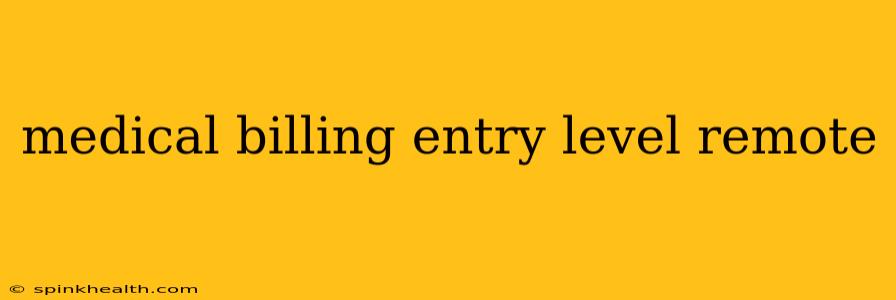Unlocking Your Healthcare Career: A Guide to Entry-Level Remote Medical Billing Jobs
The healthcare industry is booming, and with it comes a surge in demand for skilled medical billers. If you're looking for a flexible, entry-level career with growth potential, working remotely in medical billing could be the perfect fit. But how do you break into this field? Let's unravel the mystery and explore the path to securing your dream remote medical billing job.
My name is Sarah, and I've been working in healthcare administration for over a decade. I've seen firsthand the incredible opportunities available in medical billing, especially for those willing to embrace remote work. This guide is based on my experience and insights, designed to help you navigate this exciting career path.
What Does a Medical Biller Do?
Before we dive into the specifics of remote work, let's clarify what a medical biller actually does. In essence, medical billers are the crucial link between healthcare providers and insurance companies. They're responsible for accurately submitting claims, following up on denials, and ensuring timely payment for services rendered. It's a detail-oriented job that requires strong organizational skills and a keen eye for accuracy. Think of them as the financial gatekeepers of the healthcare system, ensuring that doctors and clinics get paid for the care they provide.
What Skills Do I Need for Entry-Level Remote Medical Billing?
This is a question many aspiring medical billers ask, and the good news is that you don't need a medical degree! While experience is always helpful, many entry-level positions value strong foundational skills. These include:
- Proficiency in medical terminology: Understanding medical terms and procedures is vital for accurately processing claims. Online courses and medical terminology textbooks are readily available to help you build this skill set.
- Computer skills: You’ll be working with various software programs, including electronic health records (EHRs) and billing software. Familiarity with Microsoft Office Suite is a plus.
- Attention to detail: Accuracy is paramount in medical billing. A single error can delay payments or lead to claim denials.
- Communication skills: You'll be interacting with patients, doctors' offices, and insurance companies, so excellent communication is essential.
- Organizational skills: Managing numerous claims simultaneously requires strong organizational skills to ensure everything runs smoothly.
How Can I Find Entry-Level Remote Medical Billing Jobs?
Finding your first remote medical billing role requires a strategic approach. Here are some effective methods:
- Online job boards: Websites like Indeed, LinkedIn, and Monster frequently list remote medical billing positions. Be sure to tailor your resume and cover letter to each specific job description.
- Company websites: Many healthcare organizations and billing companies have career pages on their websites where you can directly apply for remote positions.
- Networking: Connect with people in the healthcare industry through online forums and professional organizations. Networking can lead to valuable leads and insider knowledge.
Are There Any Certifications That Can Help?
While not always mandatory, certifications can significantly boost your chances of landing a remote medical billing job. The Certified Professional Coder (CPC) certification, offered by the American Academy of Professional Coders (AAPC), is a highly respected credential that demonstrates your competence and knowledge. Completing this certification shows potential employers that you're serious about your career in medical billing.
What are the potential career growth opportunities?
The beauty of starting with an entry-level position is the potential for advancement. As you gain experience and expertise, you can progress to roles like:
- Senior Medical Biller: Taking on more complex claims and supervising junior billers.
- Medical Billing Manager: Overseeing a team of billers and managing the billing department.
- Revenue Cycle Manager: Taking on a more strategic role in improving the financial health of a healthcare organization.
What are the challenges of remote medical billing?
While remote medical billing offers flexibility, it also presents some challenges. These include:
- Maintaining work-life balance: It’s crucial to establish a dedicated workspace and stick to a schedule to avoid burnout.
- Dealing with technical issues: Reliable internet access and tech support are vital for successful remote work.
- Staying connected: Regular communication with colleagues and supervisors is crucial for teamwork and support.
Embarking on a career in entry-level remote medical billing requires dedication and hard work, but the rewards are well worth the effort. By developing the necessary skills, strategically searching for opportunities, and continuously learning, you can unlock a fulfilling and rewarding career in this growing field. Good luck on your journey!

